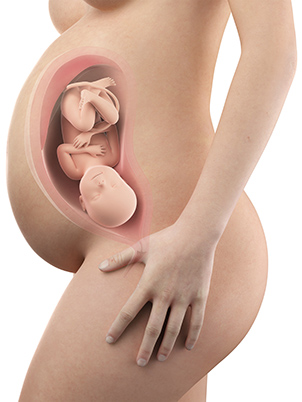Congratulations, you’ve reached week 37 of pregnancy—an amazing milestone! At this point, your baby is considered “early term,” which means you could go into labor anytime in the next few weeks, and your baby would likely do very well. While it’s common to feel a mix of excitement and nerves right now, try to remember: you are ready, and you’re doing a wonderful job preparing for your baby’s arrival.
By week 37, your baby has grown to the size of a Swiss chard bunch—probably weighing around 6.5 pounds and measuring about 19 inches long. Most of your baby’s organs are fully developed, and they’re shedding the soft “lanugo” hair that kept them warm in the womb. Their lungs and brain are still maturing, but they’re getting strong enough for life outside.

You might notice new changes in your body this week. Your baby is getting lower in your pelvis, which can make it easier to breathe, but you may feel increased pressure on your bladder—leading to more bathroom visits. Some moms find that their appetite changes, or they have a burst of energy known as the “nesting instinct.” Don’t be surprised if you find yourself organizing drawers or straightening up the nursery!
This week is also a good time to review your hospital bag and birth plan. Make sure you have comfortable clothes ready, your favorite snacks packed, and any paperwork organized. Keep emergency contacts handy, and let family and friends know your plan for when labor starts.
- You may notice practice contractions (Braxton Hicks) picking up in frequency and strength. If contractions become regular or very painful, let your healthcare provider know.
- Keep an eye out for signs of labor—such as your water breaking or a “bloody show.” Not every mom will experience these in the same way, so trust your instincts if something feels different.
- Continue paying attention to your baby’s movements. If you notice a sudden decrease, it’s best to call your doctor right away.
Above all, remember: you are not alone. Take each day as it comes, ask questions when you need to, and lean on your support system. Your little one will be here soon, and you’re getting closer every day!
Your Baby’s Development This Week
This week marks an exciting milestone: your baby is officially considered full-term! That means your little one is almost ready to arrive, and every day inside your belly makes them even stronger and healthier for their big debut. Let’s take a closer look at the amazing things happening with your baby during week 37.
Right now, your baby is putting on the finishing touches. They’re likely weighing around 6 to 7 pounds and stretching out to about 19 inches long, about the size of a small watermelon. Even though they look like a newborn already, there’s still some important development going on that will help them thrive once they’re born.
- Final Practice Breaths: Your baby’s lungs are very nearly ready for that very first breath of fresh air. Inside the womb, they’re practicing breathing movements—pulling in and pushing out amniotic fluid. Their lungs are also making more surfactant, a special substance that keeps the air sacs open and makes breathing after birth easier.
- Brain Power: The brain is growing at an amazing rate even now, building connections that will help your baby learn and experience the world. This final push in brain development is why, if there’s no medical reason to deliver early, doctors usually prefer babies to stay inside a bit longer when possible.
- Getting Stronger: Muscles and bones are firm and developed, so your baby can stretch, wiggle, and twist more than ever. Some moms even notice sharper elbows and knees poking out these days!
- Ready to Digest: Your baby’s digestive system is gearing up for feedings. Their gut now contains meconium—a thick, dark substance made of things your baby has swallowed from the amniotic fluid. This will become your baby’s first diaper change after birth!
- A Touch More Dexterity: Little hands are getting coordinated, and your baby might be grasping their foot or touching their face. Practicing these tiny movements helps them prepare for grabbing your finger after delivery.
- Sense of Security: Although your baby’s senses have been developing for weeks, the sense of touch continues to sharpen. They can respond to light and gentle presses on your belly, reassuring you that they are alert and growing just as they should.
As your baby’s organs mature, their skin becomes smoother and less wrinkled. They’re also building up a layer of fat under the skin, which helps regulate body temperature after birth. The fuzz called lanugo that once covered their body is mostly gone now, and their hair and fingernails may be ready for their first photo!
Even though it might feel like your baby is out of room to move, you should still feel regular kicks, stretches, and rolls throughout the day. Pay attention to these movements—they’re a reassuring sign that your baby is happy and healthy as delivery day gets closer.
Each day that passes brings your baby closer to being ready for life outside the womb. Keep eating well, drinking water, and resting when you can. You’ve both come so far, and soon, you’ll be able to meet your baby face-to-face!
Changes in the Mother’s Body
At 37 weeks pregnant, your body is working hard to get ready for the big event: bringing your baby into the world. While you might feel like you’ve already been through a lot of changes, this week brings some fresh experiences—some subtle, some obvious, all normal and part of the exciting process leading up to labor.
One of the clearest signs is that your baby may have moved down lower into your pelvis. This is often called “lightening” or “engagement.” If this is your first baby, you might notice that you can breathe a bit easier, since there’s less pressure on your lungs. However, this also means more weight and pressure on your bladder, which can send you to the bathroom even more often.
- Pelvic Pressure and Discomfort: With your baby settling in lower, you may feel an ache in your lower back, pelvis, or thighs. This can make walking or moving around feel more awkward, and some moms describe a new “waddle” to their walk. Try sitting down when you need a break, and consider using a pregnancy pillow at night for extra support.
- Contractions Become Noticeable: You may begin to feel more pronounced tightening in your belly. These are often called “practice contractions” and can come and go throughout the day. They aren’t usually painful, but they may feel stronger or more frequent compared to earlier weeks. If contractions become regular or start to hurt more, call your healthcare provider just to be safe.
- Changes in Vaginal Discharge: Some women notice an increase in vaginal discharge at this stage. It might be clear, white, or slightly pink. If you see mucus with a bit of blood—a “bloody show”—it’s a sign that labor is getting closer, but it can still be days away.
- “Nesting” Urge: Many expecting moms find a sudden burst of energy and a strong drive to clean, organize, or prepare the home for baby’s arrival. While it’s fine to follow your instincts, be sure not to overdo it—rest is just as important right now.
- Leaking Colostrum: Your breasts might begin to leak a thick, yellowish fluid called colostrum. This is the first nutrition your baby will receive if you plan to breastfeed. You might want to keep some nursing pads on hand to protect your clothes.
- Shifting Sleep Patterns: As your belly grows and you experience more trips to the bathroom, getting comfortable at night can be tricky. Try sleeping on your left side with a pillow between your knees, and limit fluids right before bedtime to help with sleep.
As you notice each of these changes, remember they are helpful signs that your body is preparing for labor. Every woman’s experience is unique—while some feel increased energy and excitement, others may feel more tired, sore, or uncomfortable. Be gentle with yourself, listen to your body, and don’t hesitate to reach out to your healthcare team with any questions. You’re almost there!
Medical Checkups You’ll Need at 37 Weeks Pregnant
Welcome to 37 weeks—you’re officially full-term and just a short time away from meeting your baby! At this point, doctor visits usually happen every week, and these checkups are especially important for making sure both you and your little one are healthy and ready for birth.
Here’s what you can expect at this stage:
- Checking Your Blood Pressure: Your healthcare provider will take your blood pressure at every appointment. This helps spot conditions like preeclampsia, which can develop quickly in late pregnancy. High blood pressure, headaches, or changes in vision are all things to mention right away.
- Measuring Your Belly: Expect your belly to be measured from the top of your uterus down to your pubic bone. This is a simple way for your provider to keep track of your baby’s growth and check that everything is progressing as expected.
- Baby’s Position Check: Your doctor or midwife will gently feel your belly (and sometimes use an ultrasound or hands-on techniques) to see if your baby has moved into a head-down spot for birth. If your baby is still breech (bottom first), your provider will talk about possible next steps or ways to encourage your baby to turn on their own.
- Examining Your Cervix: Many care teams start checking your cervix now for signs that your body is getting ready for labor. They’ll check for how much it’s softened (effaced) or opened (dilated). Every woman is different—some have lots of change, others don’t until labor begins, so there’s no right or wrong pace.
- Testing for Group B Strep (GBS): If you haven’t already had it, you may get a simple swab test for Group B Streptococcus. This checks for bacteria that are harmless to you but could make your baby sick at birth. If positive, you’ll likely get antibiotics during labor, just to keep your newborn safe.
- Fetal Heartbeat Monitoring: Your baby’s heartbeat will be listened to at every visit. That quick little rhythm is reassuring—and hearing it can be a sweet, motivating moment as you count down the final days.
- Questions About Baby’s Movements: Your provider will ask if your baby is still moving regularly. It’s important to speak up if you notice any drop in activity, because your baby’s movements are one of the best signs that all is well.
- Conversations About Labor: You’ll talk about what to watch out for—like contractions, your water breaking, or any signs of trouble. This is a great time to ask questions about your birth plan, or voice any worries you might have.
- Vaccination Updates: If you haven’t already, your care team may offer you the RSV vaccine during this appointment. Getting this vaccine can help protect your newborn from certain respiratory infections in those first months of life.
Every checkup brings you and your care team new information, helping to tailor support for your unique pregnancy. Don’t hesitate to jot down questions and bring them with you—your well-being and peace of mind are just as important as any screening or exam. You’re not alone on this journey, and every visit is a step closer to holding your baby in your arms.
Nutritional Tips and Physical Exercise
At 37 weeks pregnant, you’re in the home stretch—your body is working hard to nourish both you and your baby right up to the big day. Now is a great time to pay special attention to how you’re fueling your body and moving each day. Simple changes can help you feel more comfortable and prepared for labor and delivery.
- Eat small, frequent meals: Your growing baby and uterus may leave less room for your stomach, making big meals uncomfortable. Try eating smaller portions throughout the day to keep your energy steady and ease heartburn.
- Boost your fiber intake: As your digestive system slows down in late pregnancy, constipation can become more common. Add fiber-rich foods like leafy greens, whole grains (such as oatmeal or brown rice), sweet potatoes, and berries to your meals. This can help things move along and keep you feeling your best.
- Choose iron-rich foods: Your blood volume is still higher than usual, so your body needs more iron to help deliver oxygen to your baby. Snack on foods like lentils, spinach, eggs, or fortified cereals, and pair them with vitamin C (like citrus fruits) to absorb iron more efficiently.
- Keep healthy snacks on hand: Quick bites like hummus with veggie sticks, hard-boiled eggs, or a handful of nuts can curb hunger and provide lasting energy, especially if sleep is interrupted or you’re on the move.
- Stay hydrated: Drinking enough water can help prevent swelling, aid digestion, and even cut down on Braxton Hicks contractions. Carry a water bottle and take sips regularly, especially if the weather is warm or you’re walking more.
- Choose gentle physical activity: Simple movements, like walking, can help keep your body flexible and your mood positive as you wait for labor to begin. Even short daily walks can boost your circulation and make it easier to sleep at night. If you’re comfortable, gentle prenatal yoga or stretching exercises can also reduce aches and help you connect with your changing body.
- Practice relaxation exercises: Deep breathing, mindfulness, or guided imagery can help calm your mind and reduce anxiety about labor. Even five minutes a day can make a difference in how you feel mentally and physically.
- Listen to your body: If you’re feeling tired or notice any discomfort, take a break. Rest is just as important as movement right now. Prop up your feet, lie on your left side, or ask for help with daily chores so you don’t overexert yourself.
Remember, every mom’s experience is unique. If you have questions about specific foods, supplements, or exercises—especially if you have any health concerns—your healthcare provider is there to help. Taking care of yourself now helps set you and your baby up for a healthy birth and recovery. You’re almost there!
Weekly Checklist
Congratulations — you’ve made it to 37 weeks! Your baby is now considered full-term, and it’s normal to have a mix of excitement and nerves at this stage. Here’s a helpful checklist to guide you through this important week and help you feel more confident as you get ready to welcome your baby.
- Pack Your Hospital Bag: Double-check your hospital bag. Make sure you have your ID, insurance info, comfy clothes, toiletries, snacks, and anything special you want for labor or post-birth, like a favorite blanket or playlist.
- Confirm Your Birth Plan: Go over your birth plan (if you have one) and share it with your partner or support person. Include preferences for pain management, who you’d like in the room, and any cultural or religious wishes.
- Install and Check Baby’s Car Seat: Make sure you have an approved infant car seat installed correctly in your vehicle. Practice buckling and unbuckling so you feel confident when it’s time to go home as a new family.
- Plan Easy Meals: Prepare a few simple meals and freeze them, or stock up on healthy foods that are quick to prepare. This will save you time and energy once your baby arrives.
- Keep Your Phone Charged: Set up a contact list for family, close friends, and your health provider. Keep your phone charged and nearby—you’ll want to easily reach out when you go into labor.
- Track Baby’s Movements: Even though your baby takes up more space now, regular movements (like rolling or stretching) are important. If you notice your baby is less active, call your healthcare provider right away.
- Arrange Child and Pet Care: If you have other children or pets, finalize their care plan for when you go into labor. Let your chosen caretakers know where everything is and what your children or pets might need.
- Review Signs of Labor: Refresh yourself on labor symptoms—like strong, regular contractions, loss of fluid, or a sudden decrease in baby movement—so you know when to call your provider or head to the hospital.
- Take Time to Rest: Rest when you need to, even if you feel a burst of energy. Try putting your feet up, gentle pregnancy stretches, or a short walk to ease discomfort. Good sleep helps your body prepare for delivery.
- Ask Last-Minute Questions: Don’t hesitate to call your healthcare provider with any questions or concerns. Whether it’s about breastfeeding, labor expectations, or worries about recovery, it’s always OK to ask.
You’re almost at the finish line—take things one day at a time, and trust that you are doing an amazing job preparing for your baby’s arrival!
When to Call Your Provider
As you reach 37 weeks, it’s natural to have lots of questions about what’s normal and what’s not. While many changes are just part of this final stretch, there are certain symptoms that should always prompt a call to your healthcare provider. Trust your instincts—if something doesn’t feel right, it’s always better to ask.
- Regular, strong contractions: If you notice contractions happening every five minutes or less, and they last for at least an hour, call your doctor—this may be the start of labor.
- Leaking fluid: If you feel a gush or steady trickle of watery fluid from your vagina, even if it’s clear and odorless, it could be your water breaking.
- Heavy vaginal bleeding: Spotting can be normal, but if you see bright red blood or soaking through a pad within an hour, it’s important to seek help right away.
- Severe headaches or vision changes: Blurred vision, seeing spots, sudden headaches, or feeling dizzy could be signs your blood pressure is too high.
- Sudden swelling: Swelling in your hands, face, or around your eyes that comes on quickly (not just puffy feet after a long day) can be a warning sign.
- Severe pain: Sharp or constant pain in your belly that doesn’t go away, especially if it comes with nausea, fever, or chills, should never be ignored.
- Fever: Any temperature over 100.4°F (38°C) could mean an infection—call your provider to discuss what’s happening.
- Change in baby’s movement: If you notice your baby is moving less than usual, or if hours go by without much activity, make sure to reach out to your doctor.
- Difficulty breathing or chest pain: If you feel unusually short of breath or have pain in your chest, it’s important to get help quickly.
- Feeling generally “off” or unwell: Sometimes, it’s just a gut feeling. If you can’t put your finger on it but something feels different, don’t hesitate to call—it’s always okay to ask for reassurance or advice.
Remember, your care team is there for you and wants to support you through a healthy delivery. No worry is too small, so don’t be shy about picking up the phone if you’re unsure. Trust your body and listen to what it’s telling you—you know it better than anyone else!
Preparations for Baby
You’re almost there! With just a few weeks left, it’s completely normal to feel a mix of excitement and nerves. This is a great time to shift your focus from big preparations to smaller, comforting touches that help both you and your baby feel ready to meet each other.
- Set up your resting spots: Make a cozy spot for feeding and cuddling your baby. Place a comfy chair or a pile of pillows in a quiet corner, and keep snacks, water, and burp cloths nearby for those late-night moments.
- Stock up on easy meals: Prepare a few simple dishes or stash some healthy frozen meals. Even sandwiches or cut-up fruit in the fridge can be a lifesaver when you’re too tired to cook.
- Finish any last-minute baby laundry: Wash a handful of newborn clothes, blankets, and washcloths using gentle detergent, and have them organized where you can easily reach them.
- Practice your hospital bag drill: Have your bag packed with comfortable clothes, phone charger, snacks, important documents, and anything that helps you feel at home. Review the quickest way to get to your birthing place, even at odd hours.
- Create a calm atmosphere: Soft lighting, your favorite music, or a soothing scent can make your space more peaceful. This helps when you need to relax or catch a quick nap.
- Delegate little tasks: Ask friends or family to help with things like pet care or stopping by for grocery runs if you feel too tired.
- Jot down your wishes: Take a moment to write down questions for your doctor or note any preferences you have for labor and baby care. This makes it easier to remember everything in the busy weeks ahead.
- Keep your phone charged: Make sure important contacts, like your partner and hospital, are saved and easy to dial when the time comes.
- Take a few quiet moments just for you: Sit down, breathe deeply, and picture meeting your baby for the first time. Simple moments of calm can help you feel more centered and prepared for what’s ahead.
Remember, no home is ever “perfectly” ready. What matters most is that you’re prepared to welcome your little one with love and care—and you’ve already done so much. Trust yourself; you and your baby will find your own rhythm together.
Citations and References
The American College of Obstetricians and Gynecologists (ACOG) – Explains full-term pregnancy, signs of labor, cervical checks, and recommendations for personal care in late pregnancy. Visit Source
Centers for Disease Control and Prevention (CDC) – Details on full-term gestation, RSV vaccination for pregnant people, and newborn respiratory health. Visit Source
World Health Organization (WHO) – Defines pregnancy milestones including full-term, and recommends self-care and monitoring for signs of labor and complications. Visit Source
Mayo Clinic – Covers fetal development at 37 weeks, common maternal symptoms, labor signs, and self-care practices. Visit Source
Cleveland Clinic – Provides guidance on fetal growth, engagement (“baby dropping”), labor symptoms, and dietary recommendations for the final weeks. Visit Source
National Institutes of Health (NIH) / MedlinePlus – Discusses physical changes at 37 weeks, fetal development, and when to contact a healthcare provider. Visit Source










